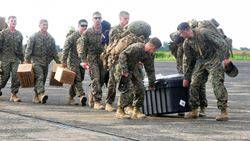Health authorities in many European countries have been preparing for the possible arrival of suspected and confirmed cases of Ebola, following guidelines issued by the World Health Organization.
The British government announced on Thursday it was stepping up its Ebola screening at airports, responding to growing public fears about the spread of the virus to Europe, and following reports of the death of a British citizen in Macedonia.
The government announced that screening will start at London’s Heathrow and Gatwick airports, and at the Eurostar train terminal.
British authorities said travellers from Sierra Leone, Liberia and Guinea will be asked about recent travel, who they have been in contact with and their onward travel plans. Medical assessment could be given by trained staff on site.
The Russian Emergencies Ministry displayed on Thursday a Russian plane designed to transfer any infected Ebola patients.
The ministry has also offered help to European states to work with those who are infected with Ebola.
The news of the unidentified Briton's death in Skopje on Thursday comes as the head of the World Bank and West African leaders warned that the virus threatens the entire African continent.
Health officials in the Macedonian capital, however, cautioned that the diagnosis could not be confirmed until a German laboratory had completed its analysis.
Britain's Foreign Office in London said it was investigating the case.
The Briton was taken to Skopje's hospital for Infectious Diseases after the hotel where he was staying called the emergency services, Macedonia's health ministry spokeswoman Jovanka Kostovska said.
He complained of stomach pain and "refused to eat or to see a doctor," she said.
The patient was admitted to the hospital and passed away shortly after. Officials said the man's symptoms, and the speed at which they developed, led them to suspect Ebola.
Under quarantine
The Skopje hotel where he was staying was sealed off and those thought to have had contact with him were put under quarantine.
Health officials did not name the victim, saying only that he was born in 1956.
The man arrived in Macedonia from London on October 2 and was not thought to have travelled to any countries affected by the Ebola virus, his friends were reported to have said.
The world's largest outbreak of the disease has killed 3,865 people out of 8,033 infected so far this year, mainly in Liberia, Sierra Leone and Guinea, according to the World Health Organization's latest count.
A nurse in Spain this week became the first person to contract the killer virus outside Africa, after caring for two repatriated Ebola patients at a Madrid hospital.
In Australia, authorities said eleven people have been tested for the disease in recent weeks.
A Red Cross nurse who worked with patients of the virus in Sierra Leone reported a low-level fever on Thursday after returning to Australia, but came back negative of the virus after a test, although she is still only 10 days into the 21-day incubation period during which infection can happen.
On Wednesday, a Liberian man who contracted the disease had died in the United States after travelling to the state of Texas.
On Thursday, an official from the US Centers for Disease Control and Prevention warned that strong measures must be taken to prevent the disease from becoming the world's next AIDS epidemic.
These America medics are among the many volunteers training to be deployed to the worst affected countries in West Africa.
PHOTO CAPTION
U.S marines arrival at the Roberts International airport in Monrovia, Liberia, Oct. 9, 2014
Al-Jazeera


 Home
Home Discover Islam
Discover Islam Quran Recitations
Quran Recitations Lectures
Lectures
 Fatwa
Fatwa Articles
Articles Fiqh
Fiqh E-Books
E-Books Boys & Girls
Boys & Girls  Ramadan
Ramadan Fatwa Audios
Fatwa Audios Month of Mercy
Month of Mercy Women
Women Eed Al- Fitr
Eed Al- Fitr Food Recipes
Food Recipes Videos
Videos

 Prayer Times
Prayer Times












